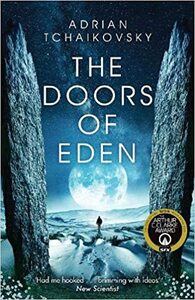Take a photo of a barcode or cover
adventurous
emotional
inspiring
mysterious
medium-paced
Plot or Character Driven:
A mix
Strong character development:
Yes
Loveable characters:
Yes
Diverse cast of characters:
Yes
Flaws of characters a main focus:
Yes
adventurous
emotional
lighthearted
mysterious
tense
fast-paced
Plot or Character Driven:
Plot
Strong character development:
Yes
Loveable characters:
Yes
Diverse cast of characters:
Yes
Flaws of characters a main focus:
No
adventurous
medium-paced
Plot or Character Driven:
A mix
Strong character development:
Yes
Loveable characters:
Complicated
Diverse cast of characters:
Yes
Flaws of characters a main focus:
Yes
Moderate: Transphobia
That was messy. It came together eventually at the end, but damn, it was a mission to get to that point.
From a world-building perspective, this was decent. The 'other' worlds we got glimpses of had some clever creativity and the way everything was built up was just about comprehensible. I was a tad disappointed about the generic 'portal fantasy' elements that were never explained particularly well but at least they were well integrated into the overarching story. It's very light on the science though, so if you're expecting a harder level of sci-fi like in [b:Children of Time|25499718|Children of Time (Children of Time, #1)|Adrian Tchaikovsky|https://i.gr-assets.com/images/S/compressed.photo.goodreads.com/books/1431014197l/25499718._SY75_.jpg|45276208], then you'll be disappointed.
The story struggled to hook me in until right at the end which meant that my mind kept wandering through most of the story. Some story-points ended up feeling overly convenient at times and the bloated middle ended up feeling mostly inconsequential in the big scheme of things. The writing was at least strong overall, even if some writing choices were ultimately detrimental to my overall enjoyment.
As unengaging as the plot was, the characters were the real stumbling block of this book. The enormous cast never got a chance to develop individually and consequently, made it hard to care about any of their fates. The antagonist character was almost a comic book villain whose inclusion in the latter parts of the story was so contrived, it mostly took me out of the story. The rest were fine in that they served the story for the most part (the two characters we start with felt very unnecessary though), but no one really came off the page or did enough to leave a mark.
This was a solid 2-star. A great last act was nowhere near enough to make up for the plodding, albeit fast-paced first 75%. This felt longer than it was and while it had some great ideas and concepts, it failed thoroughly with the fundamentals of plot and character. However, if you don't mind a very plot-driven story that has it's moments and comes together for a strong ending, then I could see this appealing to you.
From a world-building perspective, this was decent. The 'other' worlds we got glimpses of had some clever creativity and the way everything was built up was just about comprehensible. I was a tad disappointed about the generic 'portal fantasy' elements that were never explained particularly well but at least they were well integrated into the overarching story. It's very light on the science though, so if you're expecting a harder level of sci-fi like in [b:Children of Time|25499718|Children of Time (Children of Time, #1)|Adrian Tchaikovsky|https://i.gr-assets.com/images/S/compressed.photo.goodreads.com/books/1431014197l/25499718._SY75_.jpg|45276208], then you'll be disappointed.
The story struggled to hook me in until right at the end which meant that my mind kept wandering through most of the story. Some story-points ended up feeling overly convenient at times and the bloated middle ended up feeling mostly inconsequential in the big scheme of things. The writing was at least strong overall, even if some writing choices were ultimately detrimental to my overall enjoyment.
As unengaging as the plot was, the characters were the real stumbling block of this book. The enormous cast never got a chance to develop individually and consequently, made it hard to care about any of their fates. The antagonist character was almost a comic book villain whose inclusion in the latter parts of the story was so contrived, it mostly took me out of the story. The rest were fine in that they served the story for the most part (the two characters we start with felt very unnecessary though), but no one really came off the page or did enough to leave a mark.
This was a solid 2-star. A great last act was nowhere near enough to make up for the plodding, albeit fast-paced first 75%. This felt longer than it was and while it had some great ideas and concepts, it failed thoroughly with the fundamentals of plot and character. However, if you don't mind a very plot-driven story that has it's moments and comes together for a strong ending, then I could see this appealing to you.
3.5*
Light spoilers ahead.
The Doors of Eden started out great but lost steam about halfway. While we're presented with six POVs, it's disappointing that they don't really grow over the course of the book, which makes the characters quite one dimensional: the lesbian lovers, the government types, the scientist, the baddies. The ending had no tension, as I didn't really care what happened to them.
The villain is very weak and unconvincing, with stock bad guy traits like hating transgender people, xenophobia, selfishness and so on. It's also weird how his motivations keep shifting throughout the book, so much so that I couldn't take him seriously.
What stands out in this novel is its premise: what if beings with consciousness evolved in different geological eras, Earth's history diverging into multiple timelines, but ultimately somehow becoming connected, at a later date? While this is really cool and I loved the interludes describing the potential species, which were also masterfully integrated in the main narrative, how this is achieved is woefully under-explained, hand-wavy and vague. Characters often describe having achieved something using "math"; that's just not enough.
An OK read, but with a lot of missed potential.
Light spoilers ahead.
The Doors of Eden started out great but lost steam about halfway. While we're presented with six POVs, it's disappointing that they don't really grow over the course of the book, which makes the characters quite one dimensional: the lesbian lovers, the government types, the scientist, the baddies. The ending had no tension, as I didn't really care what happened to them.
The villain is very weak and unconvincing, with stock bad guy traits like hating transgender people, xenophobia, selfishness and so on. It's also weird how his motivations keep shifting throughout the book, so much so that I couldn't take him seriously.
What stands out in this novel is its premise: what if beings with consciousness evolved in different geological eras, Earth's history diverging into multiple timelines, but ultimately somehow becoming connected, at a later date? While this is really cool and I loved the interludes describing the potential species, which were also masterfully integrated in the main narrative, how this is achieved is woefully under-explained, hand-wavy and vague. Characters often describe having achieved something using "math"; that's just not enough.
An OK read, but with a lot of missed potential.
Daaaaaaaamn that was good.
I may be strongly biased with Tchaikovsky’s writing and I have received this book from the publisher in exchange of an honest review but the following review will be my honest review.
If you liked “Children of Time” you are probably gonna love this book. And if you though Children of Time was amazing, blew your mind and you are struggling to find something even better to keep you going: you definitely need this book. The Doors of Eden draws inspiration from the likes of Fringe and Star Trek.
The book combines the main plot and their different point of views with interludes of a book written by the Professor Ruth Emerson which are an absolute gem. It is all connected so don’t undermine them as they are wonderful small pieces of different windows that work delightfully on their own but have a meaning beyond just being mere fragments.
The plot is developed smoothly from Mal and Lee, a couple who investigates paranormal activities for fun, when one of the disappears to re appear years latter accompanied with some strange happenings around London that end up involving people in MI5, a very charismatic hacker, a mercenary and a big fish from the city. Among many others that I will leave outside to spoil as little as possible. Anything I could tell you about the plot will diminish in front of the actual plot and I honestly think the least you know the better.
The characters are absolutely amazing, specially those non human ones. I don’t know how he manages to write non human characters so well but he is excellent at it. I am positively surprised with their diversity and their development. Characters and world building are indeed the strong point of the book, to be honest I think is a strong point of the author. They make this book so rich and so diverse that I could not stop feeling in awe of his creation skills. I thought nothing would surprise me as much as Children of Time did, but I was seriously wrong. He gives so much details to all his works making them really good. So be very aware of the details because once you start connecting the dots you may end up in awe of his planning skills.
Doing a review for this book is very complex as the book is very well developed and has a lot of sides and I would love to tell you all about all those aspects but I honestly think the least you know, the better.
I cannot encourage you enough to go and get the book as soon as it comes out.
I may be strongly biased with Tchaikovsky’s writing and I have received this book from the publisher in exchange of an honest review but the following review will be my honest review.
If you liked “Children of Time” you are probably gonna love this book. And if you though Children of Time was amazing, blew your mind and you are struggling to find something even better to keep you going: you definitely need this book. The Doors of Eden draws inspiration from the likes of Fringe and Star Trek.
The book combines the main plot and their different point of views with interludes of a book written by the Professor Ruth Emerson which are an absolute gem. It is all connected so don’t undermine them as they are wonderful small pieces of different windows that work delightfully on their own but have a meaning beyond just being mere fragments.
The plot is developed smoothly from Mal and Lee, a couple who investigates paranormal activities for fun, when one of the disappears to re appear years latter accompanied with some strange happenings around London that end up involving people in MI5, a very charismatic hacker, a mercenary and a big fish from the city. Among many others that I will leave outside to spoil as little as possible. Anything I could tell you about the plot will diminish in front of the actual plot and I honestly think the least you know the better.
The characters are absolutely amazing, specially those non human ones. I don’t know how he manages to write non human characters so well but he is excellent at it. I am positively surprised with their diversity and their development. Characters and world building are indeed the strong point of the book, to be honest I think is a strong point of the author. They make this book so rich and so diverse that I could not stop feeling in awe of his creation skills. I thought nothing would surprise me as much as Children of Time did, but I was seriously wrong. He gives so much details to all his works making them really good. So be very aware of the details because once you start connecting the dots you may end up in awe of his planning skills.
Doing a review for this book is very complex as the book is very well developed and has a lot of sides and I would love to tell you all about all those aspects but I honestly think the least you know, the better.
I cannot encourage you enough to go and get the book as soon as it comes out.
challenging
medium-paced
Plot or Character Driven:
Plot
Strong character development:
No
Loveable characters:
No
Diverse cast of characters:
Yes
Flaws of characters a main focus:
No
dark
reflective
tense
medium-paced
Plot or Character Driven:
A mix
Strong character development:
Yes
Loveable characters:
Yes
Diverse cast of characters:
Yes
Flaws of characters a main focus:
Complicated
Omg. This book. Let me start by saying that it wasn’t what I was expecting. I was thinking “children of time” when I saw this one by one of my auto buy authors and was very excited! But it’s nothing like children of time, it’s not even sci-fi in the respect of space exploration or galactic empires, it’s more cryptozoology sci-fi and whilst I wasn’t sure whether that was okay or not, by the end I was certain that this book was a fresh take at a new and very unexplored part of the sci-fi genre and I am here for it, it’s eerie, scary and brilliant!
I believe Adrian Tchaikovsky has a sci-fi specialty and, with this book, he went a little crazy with it. I believe he did it best with Children of Time, zooming in and spending all of the time with one, specific species and helped me understand everything about the species and the society it created. This one's more concise and yet it also goes all over the place. For Doors of Eden, I would've appreciated drilling down further on these new subjects to learn everything. I'd rather have a master of two or three subjects rather than a jack of all trades.
Despite any criticism I offer, I deeply appreciate Tchaikovsky's brand of imaginative and vivid sci-fi, and I'll be on the lookout for more in the coming years.
Despite any criticism I offer, I deeply appreciate Tchaikovsky's brand of imaginative and vivid sci-fi, and I'll be on the lookout for more in the coming years.





